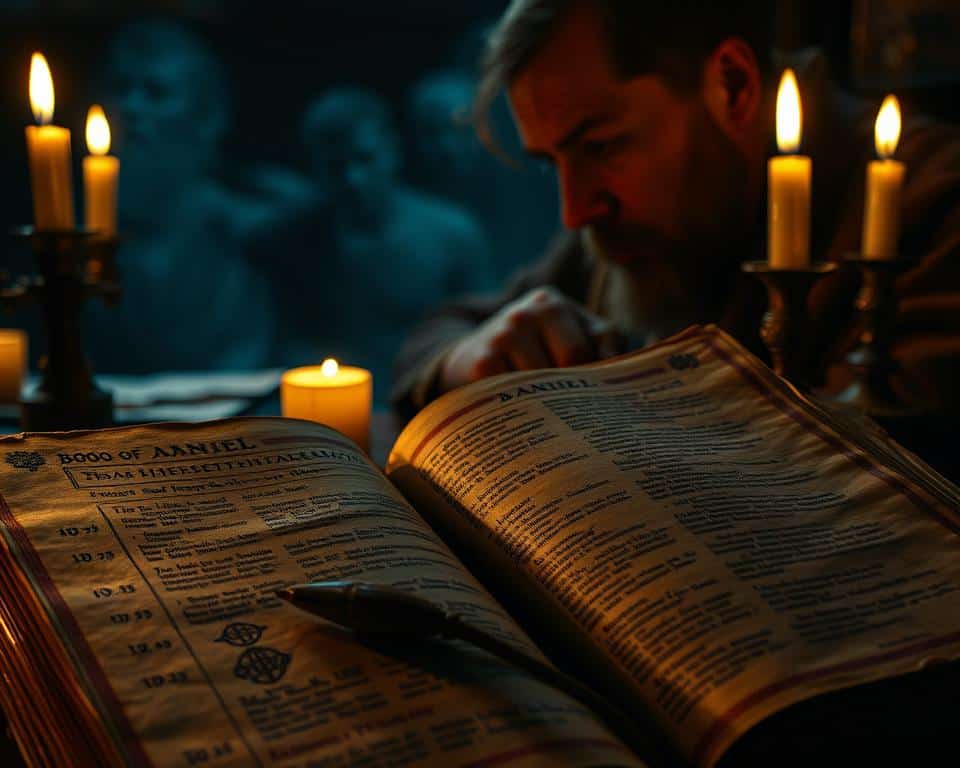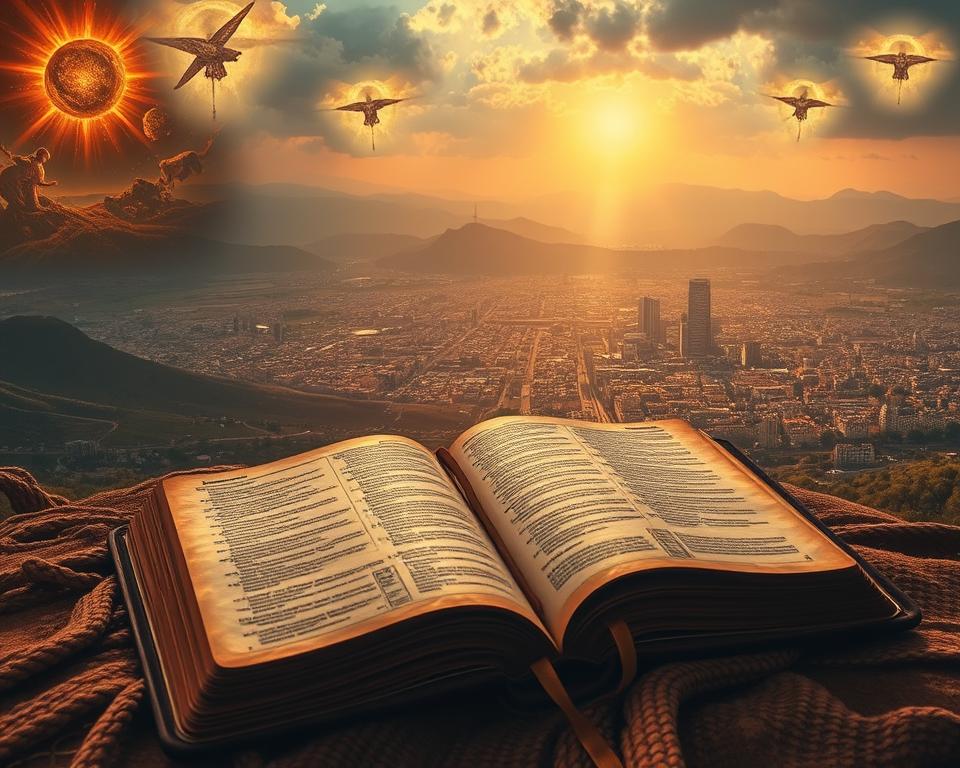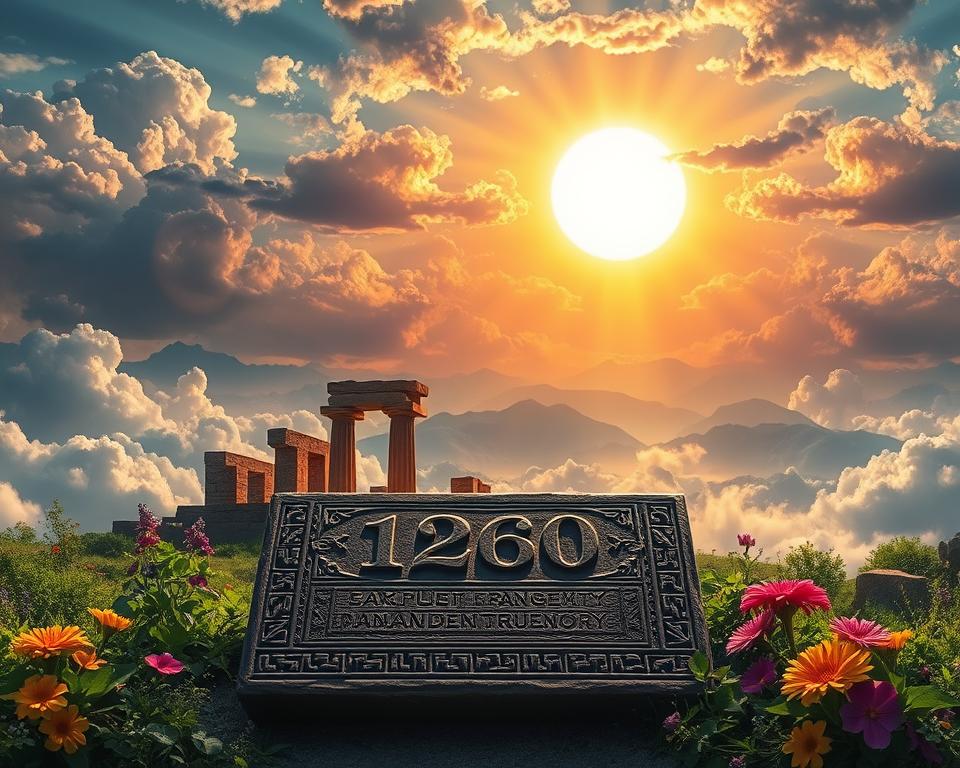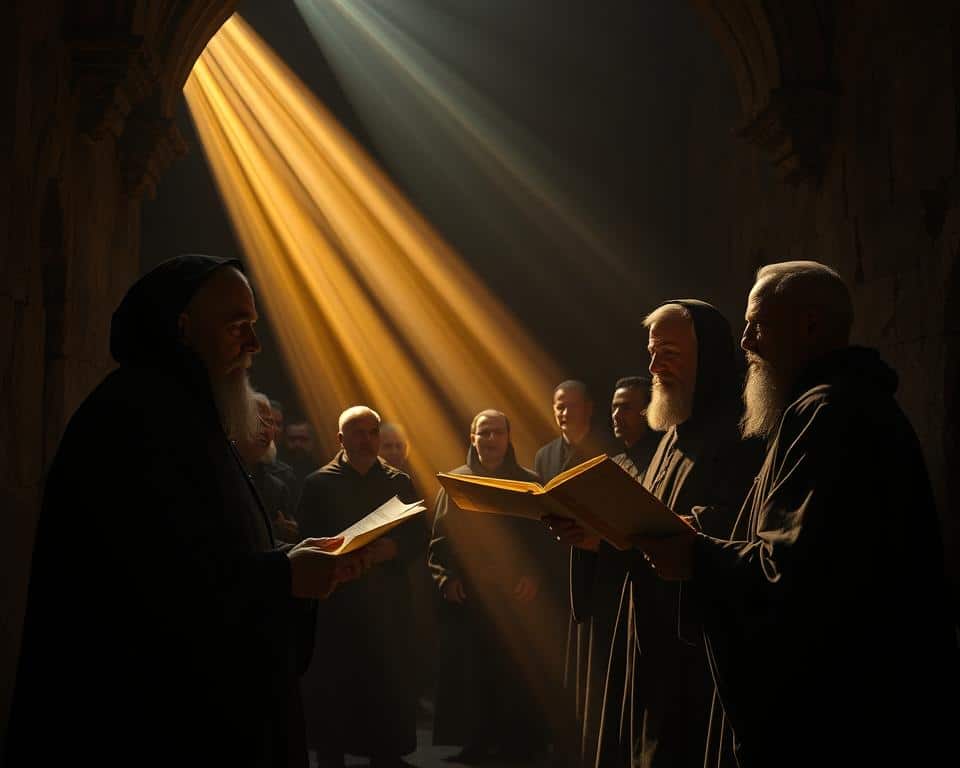The book Isaiah delivers powerful messages of warning and hope. Written by a prophet in ancient Judah, it reveals God’s justice for rebellion—but also His unwavering faithfulness. If you’ve ever wondered how divine judgment and redemption intertwine, this text holds the answers.
Isaiah’s words weren’t just for his time. They point to a future Savior who would bring hope to all nations. Through vivid imagery, he describes both consequences for sin and the promise of restoration. This duality makes his prophecies essential for grasping God’s plan in Scripture.
Ready to explore these timeless truths? Let’s uncover the depth of Isaiah’s vision—one that still speaks to us today.
Who Was Isaiah and Why Do His Prophecies Matter?
For over four decades, Isaiah stood as God’s voice to a nation in turmoil. His messages weren’t just for his time—they echoed through centuries, warning of judgment and promising hope. If you’ve ever wondered how one man’s words could shape history, his story holds the key.
Isaiah’s Role as a Prophet in Judah
Isaiah served under four kings, from Uzziah to Hezekiah (740-686 BCE). He confronted corruption in Jerusalem’s temples and palaces, calling people back to God’s truth. His courage made him a lightning rod in Judah’s darkest days.

As Assyria’s armies marched closer, Isaiah warned Judah’s kings against alliances with pagan nations. He insisted: trust God, not political deals. When leaders ignored him, invasions followed—just as he’d predicted.
The Historical Context of His Messages
Assyria’s expansion threatened Judah’s independence. Yet Isaiah’s prophecies reached beyond Assyria to Babylon’s rise—150 years before it happened. His accuracy wasn’t luck; it was divine inspiration.
By 586 BCE, Babylon exiled Judah. But Isaiah had already promised restoration. His dual themes—judgment for sin and mercy for the faithful—still speak to us today. That’s why his words matter: they reveal God’s unchanging character.
Isaiah wasn’t just a prophet of doom. He painted a future where God’s people would return, renewed. That hope? It’s for you too.
The Structure of the Book of Isaiah
From fiery rebukes to tender promises, Isaiah’s structure reveals God’s dual nature. The 66 chapters split into two stark sections—one thundering with warnings, the other glowing with restoration. This isn’t random; it’s a divine blueprint.
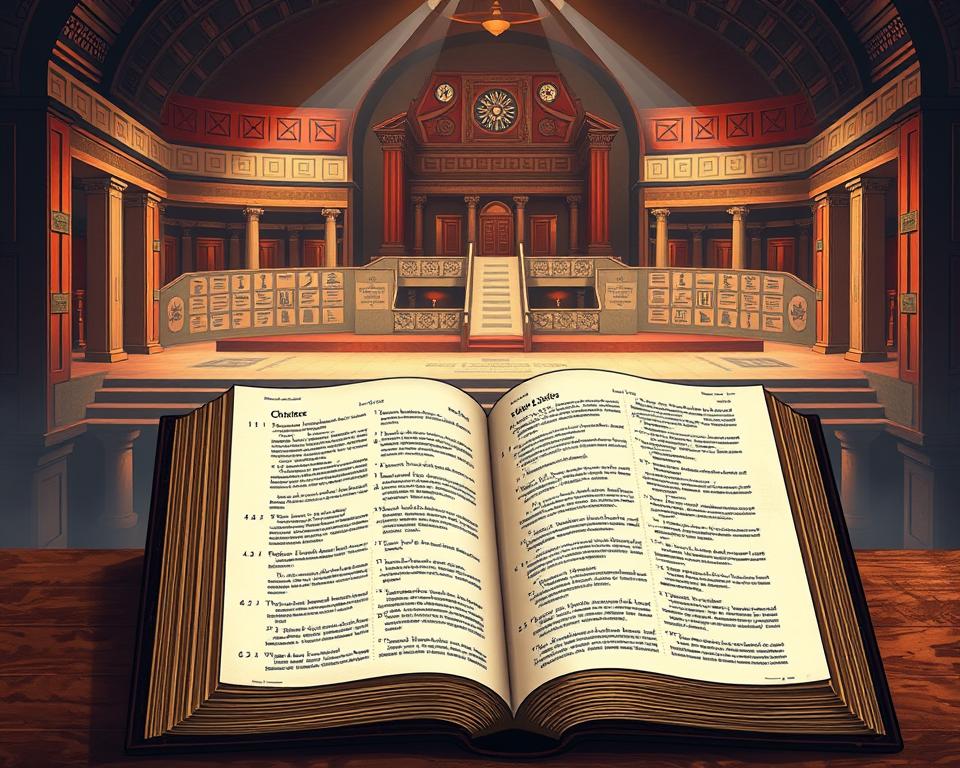
Chapters 1-39: Warnings of Judgment
The first half burns with urgency. Assyria’s shadow looms as God’s tool for judgment. Why? Judah’s rebellion and idolatry demanded purification. Like a surgeon’s scalpel, Assyria cut away corruption—but Babylon would later finish the task.
These chapters aren’t just ancient history. They mirror God’s pattern: sin demands consequences. Yet even here, glimpses of mercy peek through. A remnant would survive—the spark of future hope.
Chapters 40-66: Promises of Hope
Flip to chapter 40, and the tone soothes like a balm. Exile isn’t the end. God pledges to bring His people home and redeem all nations. The Messiah’s coming is foretold: a Suffering Servant who’d bear humanity’s guilt.
This section pulses with hope. Where early warnings shouted, these whispers promise renewal. Jerusalem’s ruins? Rebuilt. Broken covenants? Restored. It’s God’s ultimate reply to judgment: grace wins.
Isaiah’s two-part arc mirrors our own journey. Conviction precedes healing. But the finale? A redeemed world where every nation worships in joy. That’s the power of God’s word—then and now.
Major Prophecies in Isaiah
Few biblical books unveil future events with the clarity of Isaiah’s writings. His words foretold empires’ rises and falls—and a Savior’s mission. Here, you’ll discover two pillars of his vision: Jerusalem’s fall and the Messiah’s coming.
The Fall of Jerusalem and Exile to Babylon
Isaiah named Babylon 150 years before its armies crushed Judah. In chapter 39, he warned King Hezekiah: treasures looted, descendants enslaved. It happened exactly as described.
Why such precision? God’s word assures justice for rebellion. Yet even in judgment, hope flickered—a remnant would return. This wasn’t guesswork. It was divine truth etched into history.
The Coming Messiah: Immanuel and the Suffering Servant
Amid crisis, Isaiah gave a sign: “Immanuel” (7:14), meaning “God with us.” This child symbolized divine presence—but pointed further. A king from David’s line would come, called God’s son (9:6).
Chapter 53 reveals the climax: a Servant who bore humanity’s suffering. His sacrificial death would heal nations. Centuries later, Jesus fulfilled this, carrying our sins like Isaiah predicted.
- 20+ messianic prophecies—more than any Old Testament book.
- Dual roles: king (Isaiah 9:7) and priest (53:12).
- The Servant’s suffering brought redemption (53:5).
Isaiah’s Message of Judgment
Corruption and idolatry had poisoned Judah, provoking God’s righteous response. The prophet’s words laid bare a society rotten with sin—where leaders oppressed the weak and worshiped lifeless idols. Yet even in judgment, you’ll see a purpose: purification, not destruction.
Rebellion and Idolatry in Judah
Judah’s courts reeked of injustice. Judges took bribes (Isaiah 1:23), while widows starved. The temple, meant for worship, brimmed with idolatry (2:8). Their rebellion wasn’t just political—it shattered their covenant with God.
“Their land is filled with idols; they bow down to the work of their hands.” —Isaiah 2:8
God’s holiness demanded action. Idols of silver and gold (44:9-20) couldn’t save them. The deeper lesson? Sin always carries consequences—then and now.
God’s Purification Through Assyria and Babylon
Assyria’s armies seemed unstoppable. But Isaiah revealed the truth: their power came from God (10:5). They were a tool to prune Judah’s rebellion, not masters of history.
- Human kings failed: Arrogant rulers trusted alliances, not God (30:1-3).
- Divine sovereignty won: Babylon’s later invasion was foretold—and limited (39:6-7).
Judgment here wasn’t vengeful. Like a surgeon removing cancer, God’s justice aimed to heal. For us today, it’s a reminder: His corrections always carry hope.
Isaiah’s Message of Hope
Beyond judgment lies a radiant future—Isaiah’s hope-filled visions still inspire faith today. His prophecies didn’t stop at warning; they unveiled God’s plan to restore all things. If you’ve ever longed for a world without pain or division, these promises are for you.
The Promise of a New Jerusalem
The new Jerusalem will be God’s eternal capital (Isaiah 65:17-19). Unlike the fallen city, it will shine with His presence, drawing all nations to worship. Imagine a place where tears and conflict vanish—this is Isaiah’s ultimate hope.
Creation itself will rejoice. Wolves and lambs will coexist (11:6), symbolizing harmony in Messiah’s kingdom. This isn’t fantasy; it’s God’s guarantee. His word transforms ruins into glory.
The Role of the Messiah in Restoration
Isaiah’s Servant Songs point to Jesus. He’s the “light to the nations” (42:6), fulfilling Israel’s mission. Through His sacrifice, the way to God opened for everyone.
- Peacemaker: Christ’s reign ends strife (2:4).
- Temple fulfilled: Jesus replaced stone with His body (John 2:21).
- Hope today: Suffering isn’t final. His return completes Isaiah’s vision.
Isaiah’s hope isn’t distant. It’s alive in Christ—the One who makes all things new.
Themes in Isaiah’s Prophecies
Justice and mercy collide in Isaiah’s prophecies, revealing God’s unchanging character. His words expose both the weight of holiness and the reach of salvation. Here, you’ll see how divine standards and grace intertwine—for Judah and all nations.
Holiness and Justice of God
Isaiah’s vision in chapter 6 thunders: “Holy, holy, holy is the Lord” (6:3). This triplet underscores God’s perfection. His justice isn’t arbitrary—it flows from His purity.
Human systems often fail. Judges take bribes; the poor suffer. Yet God’s standards never waver. Isaiah 1:17 commands: “Learn to do right; seek justice.” This isn’t optional. It’s woven into His nature.
“The Lord is a God of justice.” —Isaiah 30:18
Assyria’s invasion proved His fairness. Rebellion had consequences. But even here, mercy flickered—a remnant would survive. God’s corrections always aim to restore.
Salvation for All Nations
Isaiah shattered narrow expectations. The Servant Songs (Isaiah 42–53) reveal a mission beyond Israel: “I will bring you as a light to the nations” (49:6). This was radical. Salvation wasn’t just for one family—it was global.
Foreigners weren’t excluded. Isaiah 56:6-8 promised: “My house will be called a house of prayer for all peoples.” God’s covenant expanded, embracing outsiders. This foreshadowed Revelation’s vision: “Every nation worshiping together” (Revelation 7:9).
The Servant’s suffering (Isaiah 53) made this possible. His sacrifice opened the way for everyone. Today, this hope still stands. God’s glory isn’t confined—it invites all into His justice and grace.
Understanding Isaiah’s Prophecies Today
Isaiah’s words still echo today, offering wisdom for faith and life. His prophecies weren’t locked in the past—they reveal timeless truths about God’s character and our response. Whether you’re facing personal struggles or societal chaos, his message cuts through the noise.
How Isaiah’s Words Apply to Modern Life
Today’s idols aren’t carved from stone but from wealth and power. Isaiah’s warning against misplaced trust rings true: “Woe to those who go down to Egypt for help” (Isaiah 31:1). Modern “Egypts” might be political saviors or material security—anything we prioritize over God.
Scripture calls us higher. Isaiah’s plea to “seek justice” (1:17) challenges us to:
- Trust God’s solutions over human alliances.
- Reject modern idolatry—materialism, nationalism, or pride.
- Live as light, reflecting God’s justice in daily choices.
Jesus: The Fulfillment of Isaiah’s Promises
In Nazareth, Jesus unrolled Isaiah’s scroll and declared: “Today this Scripture is fulfilled” (Luke 4:21). Every messianic prophecy found its fulfillment in Him: His life, teachings, and sacrificial death were the ultimate realization of the divine promises made in the Old Testament. Numerous instances throughout the New Testament illustrate how these prophecies came to fruition, affirming His identity as the Messiah. Believers often reflect on the significance of fulfilled prophecies in new testament, recognizing the continuity of God’s plan for redemption.
- Baptism: The Spirit rested on Jesus as Isaiah foretold (11:2; Matthew 3:16).
- Communion: His body and blood fulfilled the Suffering Servant’s sacrifice (53:5).
- Mission: He now invites us to join His work of renewal (Isaiah 61:1-3).
This isn’t ancient history. It’s a living hope—for you. When you doubt, remember: the same God who kept His word to Isaiah keeps His promises to you today.
Key Takeaways from Isaiah’s Prophecies
God’s pattern in Scripture is clear: rebellion brings consequences, but redemption follows. His justice and mercy intertwine, offering hope even in judgment. This truth remains vital for your faith today.
Christ stands as the ultimate fulfillment of these visions. From the Suffering Servant to the promised King, every word points to Him. Trusting His sacrifice anchors your life in God’s unchanging truth.
Let Isaiah’s message challenge you. Pursue justice. Extend mercy. In a chaotic world, God’s sovereignty never wavers. Dive deeper into His word—it’s alive with power for your journey.


